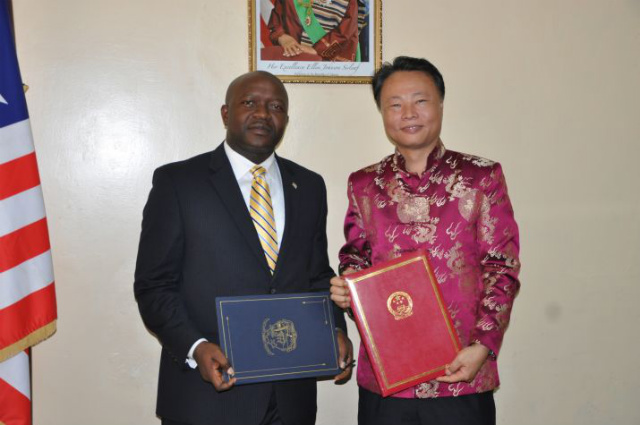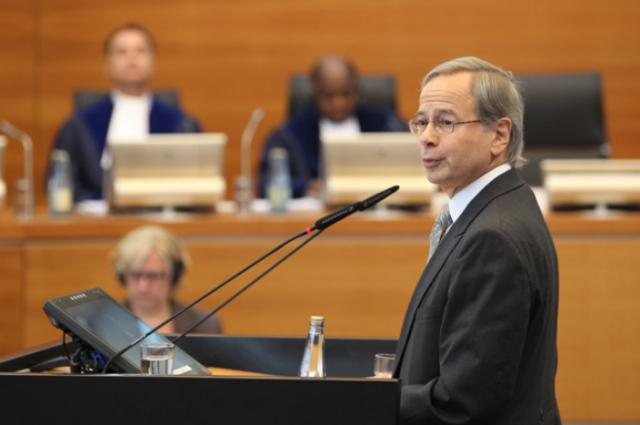 FROM LIBERIA TO PH. Zhao Jianhua (right), then China's ambassador to Liberia, poses after signing an agreement with the Liberian Foreign Minister Augustine Kpehe Ngafuan (left). File photo courtesy of the Liberian Foreign
FROM LIBERIA TO PH. Zhao Jianhua (right), then China's ambassador to Liberia, poses after signing an agreement with the Liberian Foreign Minister Augustine Kpehe Ngafuan (left). File photo courtesy of the Liberian Foreign Facing an early challenge, China's new ambassador to the Philippines has arrived in the poor country that dared to bring a rising superpower to court.
Chinese Embassy spokesman Zhang Hua told Rappler that their new envoy, Zhao Jianhua, landed in the Philippines on Sunday evening, February 23.
Zhao arrived in Manila nearly a month before the deadline for the Philippines' written pleading in its case against China at the International Tribunal for the Law of the Sea (ITLOS).
The written pleading, called a memorial, should be submitted to the ITLOS by March 30.
Zhang, the spokesman, said the embassy is coordinating with the Philippine government on when Zhao can present his credentials to President Benigno Aquino III.
Only after presenting his credentials can Zhao, previously China's ambassador to Liberia, actively begin his work in Manila.
Like his predecessor, Ma Keqing, he is expected to address a host of issues involving the dispute over the West Philippine Sea (South China Sea).
In fact, a day after he arrived, Armed Forces of the Philippines chief General Emmanuel Bautista said Chinese ships drove away Filipino fishing vessels from the disputed Panatag (Scarborough) Shoal using water cannons. The Chinese Embassy has not commented on this as of posting time.
More than this, the Philippines' written pleading will also put Zhao in the hot seat.
Under Article 62 of the ITLOS Rules of the Tribunal, a memorial shall contain “a statement of the relevant facts, a statement of law, and the submissions.”
PH's lawyer confident
In an e-mail to Rappler, the Philippines' lawyer in its case against China, Paul Reichler, said their legal team “believes that the Philippines has a strong case, both on jurisdiction and on the merits.”
Proceedings “will go a lot faster” after the Philippines files its memorial, Reichler said in a previous interview with the Wall Street Journal.
 TOPNOTCH LAWYER. The Philippines' lead counsel against China, Paul Reichler, has defended sovereign states for over 25 years. File photo from ITLOS
TOPNOTCH LAWYER. The Philippines' lead counsel against China, Paul Reichler, has defended sovereign states for over 25 years. File photo from ITLOSHe said arbitrations under the United Nations Convention on the Law of the Sea (UNCLOS) usually take 3 to 5 years. The lawyer, however, expects a ruling by mid-2015.
China, after all, has consistently rejected arbitration as a means to settle its dispute with the Philippines.
Reichler told the Wall Street Journal: “Normally, the respondent state (in this case China) would be given an equal amount of time (8 months) to submit its counter-memorial. Then, in the normal sequence, the parties would have had a second round of written pleadings, with the Philippines getting 4 or 5 months to submit a reply, and China getting the same amount of time to submit a rejoinder. However, since China has announced that it will not actively participate in the arbitration, the tribunal only fixed the date for the filing of the Philippines’ memorial.”
No to 'int'l outlaws'
In a US-based forum in December 2013, Reichler said the Philippines arms itself with the following claims before the ITLOS:
- “first and foremost,” a declaration against China's controversial 9-dash line;
- a determination that Scarborough Shoal is not an island but a group of rocks;
- and a similar determination that classifies disputed portions of the Spratly Islands as rocks
He added that while international tribunals like the ITLOS have no police force to “make the defendant comply with the order,” losing parties comply “at least 95%” of the time.
“Part of the explanation is that there is a heavy price to pay for a state that defies an international court order, or a judgment of an arbitral tribunal that is seen, that is recognized, in the international community as legitimate, as fair, as correct, as appropriate,” Reichler said. (READ: PH lawyer on China: Being 'int'l outlaw' has its price)
http://www.rappler.com/nation/51459-china-ambassador-philippines-zhao-jianhua-memorial

No comments:
Post a Comment
Note: Only a member of this blog may post a comment.